Photo: Stephanie Berger
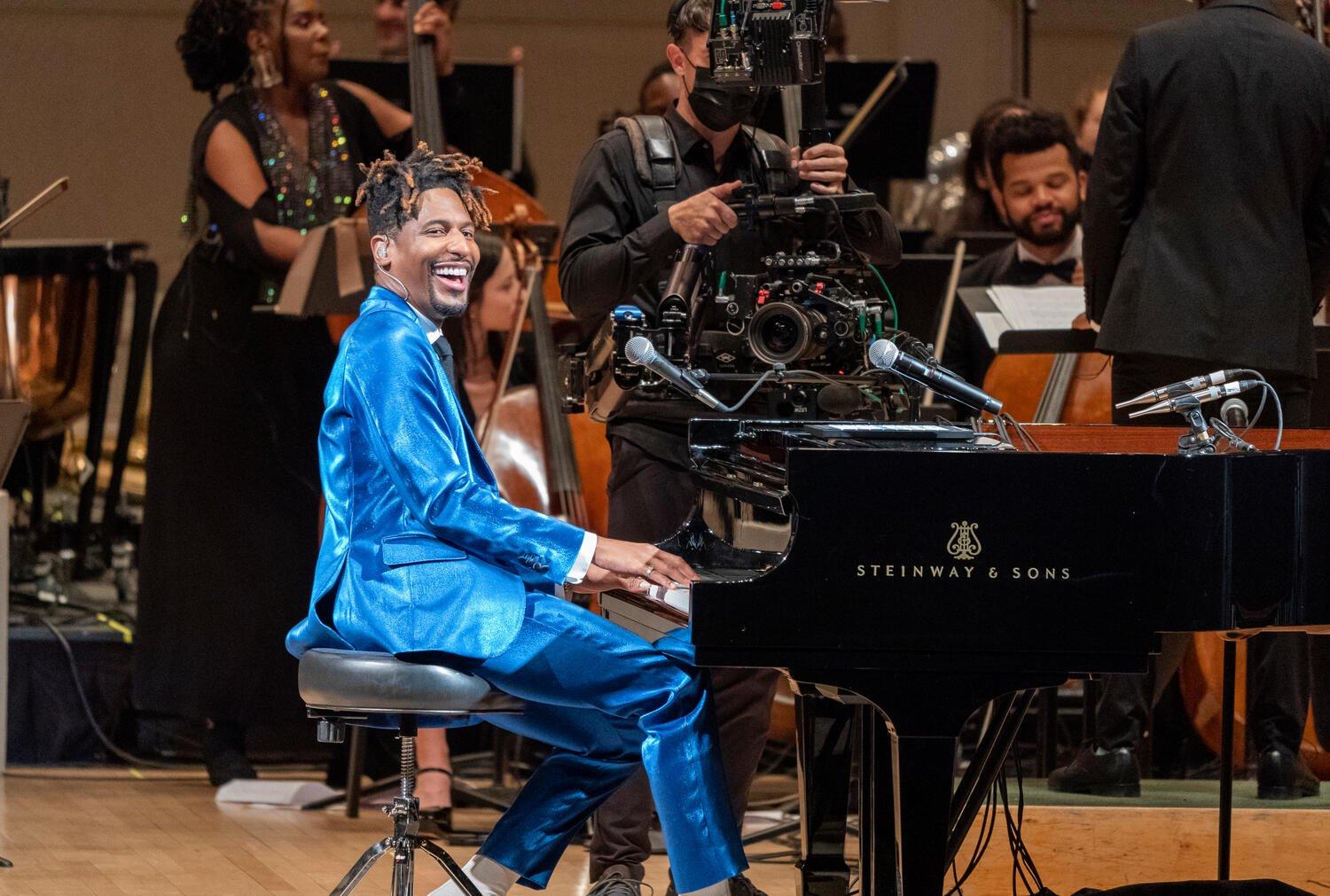
news
Here's What Went Down At The World Premiere Of Jon Batiste's 'American Symphony' At Carnegie Hall
At Carnegie Hall, Jon Batiste finally unveiled his long-awaited 'American Symphony.' And from its realism to its range to its limitless imagination, it didn't disappoint.
An industry darling paying tribute to the land of the free in what's arguably the most prestigious room in said country. The title: American Symphony. Does this sound dry, erudite, staid? Nothing could be further from the truth.
This is Jon Batiste we're talking about, he who exudes creativity, thoughtfulness and charm with every piano trill, with every shout-out to Duke, Nina, Billie and Louis, with every impish, camera-ready grin. Even sans piano, his hands tend to dance, fingers extended southward, his locks projecting in all directions.
And on Sept. 22, when Batiste strode, clad in royal blue, down the aisles of Carnegie Hall's Stern Auditorium to its Perelman stage — which those four progenitors graced — his mind was visibly whirring. (Even in his ride to the gig, he was noodling on a synth, mulling over ideas.)
After the standing ovation ceased, it was time to behold a new kind of American symphony — not a bland, flag-waving one, or one that papers over the strife and ugliness and outright horror of the nation's founding.
No, this one has banjoists and steel drummers and Afro-Latin percussionists and Indigenous vocalists and drummers. It has a hefty-looking modular synth. It has screams and police sirens and disembodied conversations. It has ominous, decaying runs at the bottom of the piano's register.
This glorious cacophony acts as the answer to Batiste's questions in the show program: "What if the symphony was invented today in America? Who would participate in the modern American orchestra? What would it sound like?" And as the five-time GRAMMY winner and 14-time nominee explains, those prompts sent him on this composerly journey more than three years ago.
Batiste was supposed to debut American Symphony back in May, a month after he swept the 2022 GRAMMYs, including a golden gramophone for Album Of The Year. After the maestro contracted COVID, the show got kicked forward to the beginning of fall; perhaps that extra time enabled him to further tighten the screws.
*Jon Batiste performing at Carnegie Hall in 2022. Photo: Stephanie Berger*
Because even during the parts where American Symphony seems to float like mist, it's tightly written and conceived. And due to its force of imagination, musical economy, and sheer diversity of sounds and ideas, there wasn't a dull moment in the performance's intermission-free two hours.
Subdivided into an overture and four conceptual movements — titled "Capitalism," "Integrity," "Globalism," and "Majesty — American Symphony takes the masked, black-tie-clad audience on a journey through the United States' manifold, oft-contradictory nature through music that majestically heaves, tormentedly deliberates, and joyously soars.
Using the monumental collaboration between Duke Ellington and Billy Strayhorn as a lodestar ("They consistently synthesized cultural lineages through the lens of a pluralistic and noble worldview," Batiste writes), he captures America's cultural multitudes through an intertwining of a vast range of African diasporic traditions — Caribbean, Brazilian, Yoruba, Haitian, Creole.
And given that New Orleans represented a nexus of these influences, the performance felt like a jubilant tribute to the Big Easy — Batiste grew up in Kenner, a suburb of New Orleans — while framing it as a wellspring and living source of American excellence.
By putting the Black experience front and center, Batiste rendered American Symphony realistic, not jingoistic. The symphony balances interpolations of patriotic mainstays like "Battle Hymn of the Republic" with songs invaluable to the civil-rights movement, like "We Shall Overcome" — all with musical suggestions of disharmony and struggle shadowing the margins.
The overture suggested a form taking shape from welter and waste, Book of Genesis style. As its vast diversity of instruments and traditions commingled, the composition swirled semi-shapelessly, until it coalesced into melodies and motifs. This isn't meant to evoke pre-colonialization American continent being, absurdly, some kind of blank slate; the conspicuous Indigenous elements drove that crucial point home. Rather, it suggests a budding republic.
In the program, Batiste cites "essential elements of the American democratic system" and "the U.S. Constitution as a reference point," stressing that "this score is a living document that will evolve over time." Likewise, the audience felt the American experiment evolving, experiencing growing pains, and reckoning with the stains of its past. And great blasts of percussion punctuated it like cannonfire.
"Capitalism" focused on "the building of cities and structures that have long since shaped the way we relate to one another and to the land." Incorporating a din of clashing electronic tones — and giving way to shimmering, Phillip Glass-like clusters of notes from the composer's Steinway — this movement shattered any preconceived notions that this would be some kind of American Revolution exhibit.
This blurred into another counterweight — an educated guess would place this in "Integrity." (The movements weren’t announced, and didn't always begin and end in straightforward fashion; often they blurred into each other.) Fiddlers suggested nascent country music, the everyday citizen, the Great Plains.
"Don't give up/ Don't give in," a gospel section sang, waried yet calming and resolute. Soon after came the clap-alongs, the exhortations, the benedictions, which kept American Symphony from ever tripping into anything lecturing or tiresome or polemical. Most everyone was on their feet.
*Jon Batiste performing at Carnegie Hall in 2022. Photo: Stephanie Berger*
After a tranquil and diffuse middle section where the intermission might have been slotted, American Symphony went lighter on signifiers and heavier on simple, strong flavors, threading wheedly synth lines into splendorous strings. Batiste kept the proceedings in something of a Goldilocks zone — charmingly ramshackle and kitchen-sink, but never sloppily so.
Following the piped-in sounds of children reciting the Pledge of Allegiance — ending with "Amen" — American Symphony concluded with an orchestral tantrum that could make one's heart leap in their throat. For an encore, Batiste took to the piano, concluding with a "Star-Spangled Banner" full of jazzy, winking syncopation and substitute chords.
If the performance seemed to weave around genre distinctions, or traditional ideas of what a symphony is, that's no accident at all. After all, this is Batiste we're dealing with; at this juncture, he's possibly mainstream music's most public and voracious omnivore.
"I don't even think genre exists," Batiste told GRAMMY.com back in 2021, upon the release of his last album, WE ARE. "Self-curation and the free exchange of information and content creates a lack of genre adherence. That kind of diversity and access changes listening habits and changes the way people perceive music."
Perhaps that's the most lasting effect of American Symphony at this stage, before it evolves and mutates and sharpens itself — like the highly variable nation of its namesake.
Without hectoring or over-explaining or shoving a reading list at you, Batiste's ambitious suite can rewire your thinking and sharpen your gaze as a citizen. All while capturing the essence of this incalculably messy yet stubbornly optimistic home of the brave.
Jon Batiste Talks New Album We Are, His Brain-Breaking Itinerary & Achieving "Freedom" From Genre
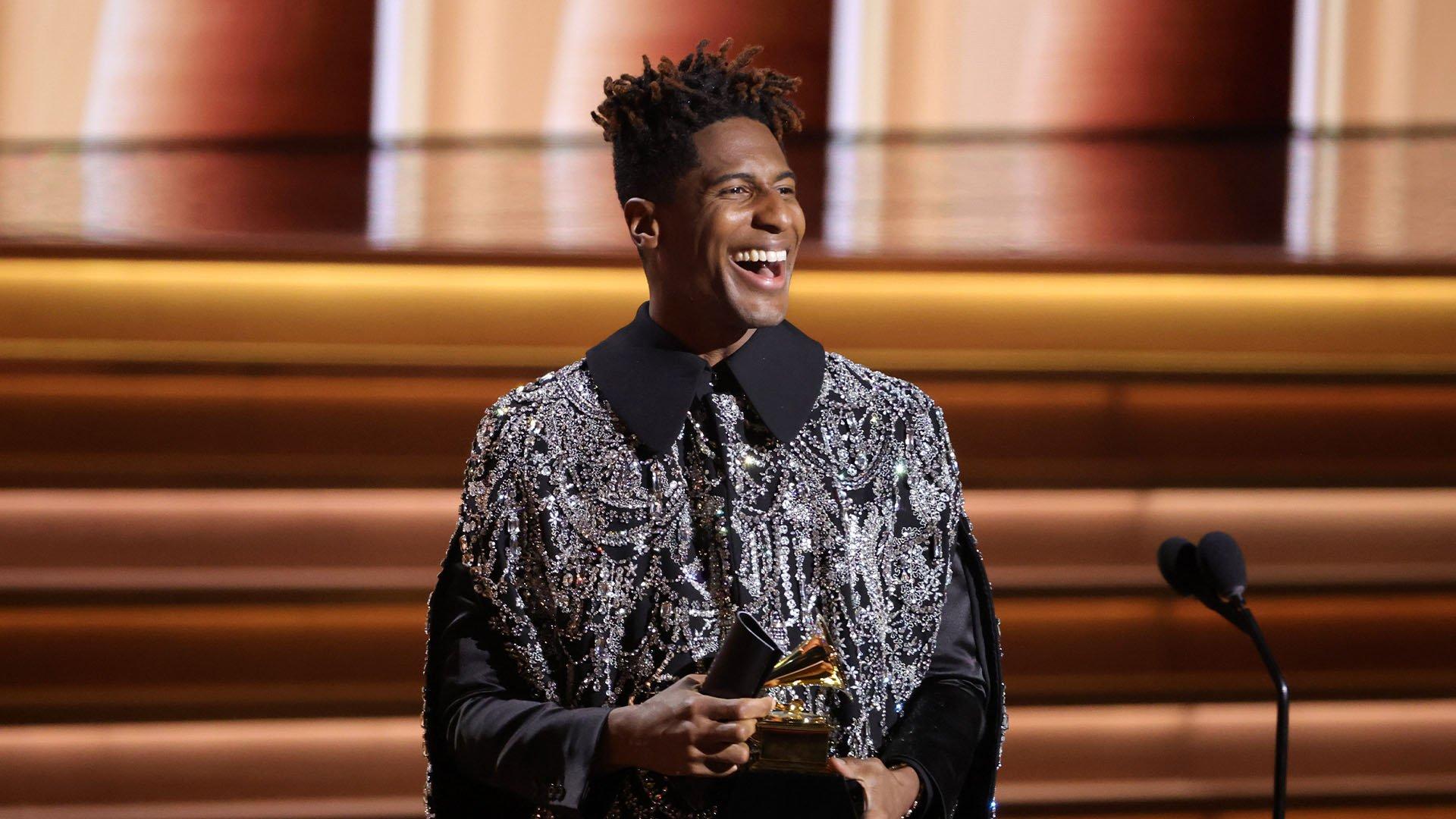
Photo: Matt Winkelmeyer/Getty Images
video
GRAMMY Rewind: Watch Jon Batiste’s Encouraging Speech For His 2022 Album Of The Year Win For 'We Are'
Jon Batiste accepts the Album Of The Year award for We Are, a win that he dedicated to "real artists, real musicians."
Jon Batiste walked into the 2022 GRAMMYs with a whopping 11 nominations, making him the most recognized artist of the evening. By the end of the night, he received five GRAMMYs for Best American Roots Performance, Best American Roots Song, Best Score Soundtrack For Visual Media, Best Music Video, and the highly coveted Album Of The Year.
In this episode of GRAMMY Rewind, watch Batiste take the stage to accept the award for Album Of The Year for his sixth studio album, We Are
Batiste began his praises by acknowledging God: "I just put my head down and work on the craft every day. I love music, he said. "I've been playing since I was a little boy. It's more than entertainment for me — it's a spiritual practice." He also thanked the "many people that went into making this album," including his grandfather, nephew, father, and executive producer, Ryan Lynn.
"This [award] is for real artists, real musicians. Let's just keep going. Be you! That's it. I love you even if I don't know you," Batiste cheered.
Press play on the video above to hear Jon Batiste's complete acceptance speech and check back to GRAMMY.com for more new episodes of GRAMMY Rewind.
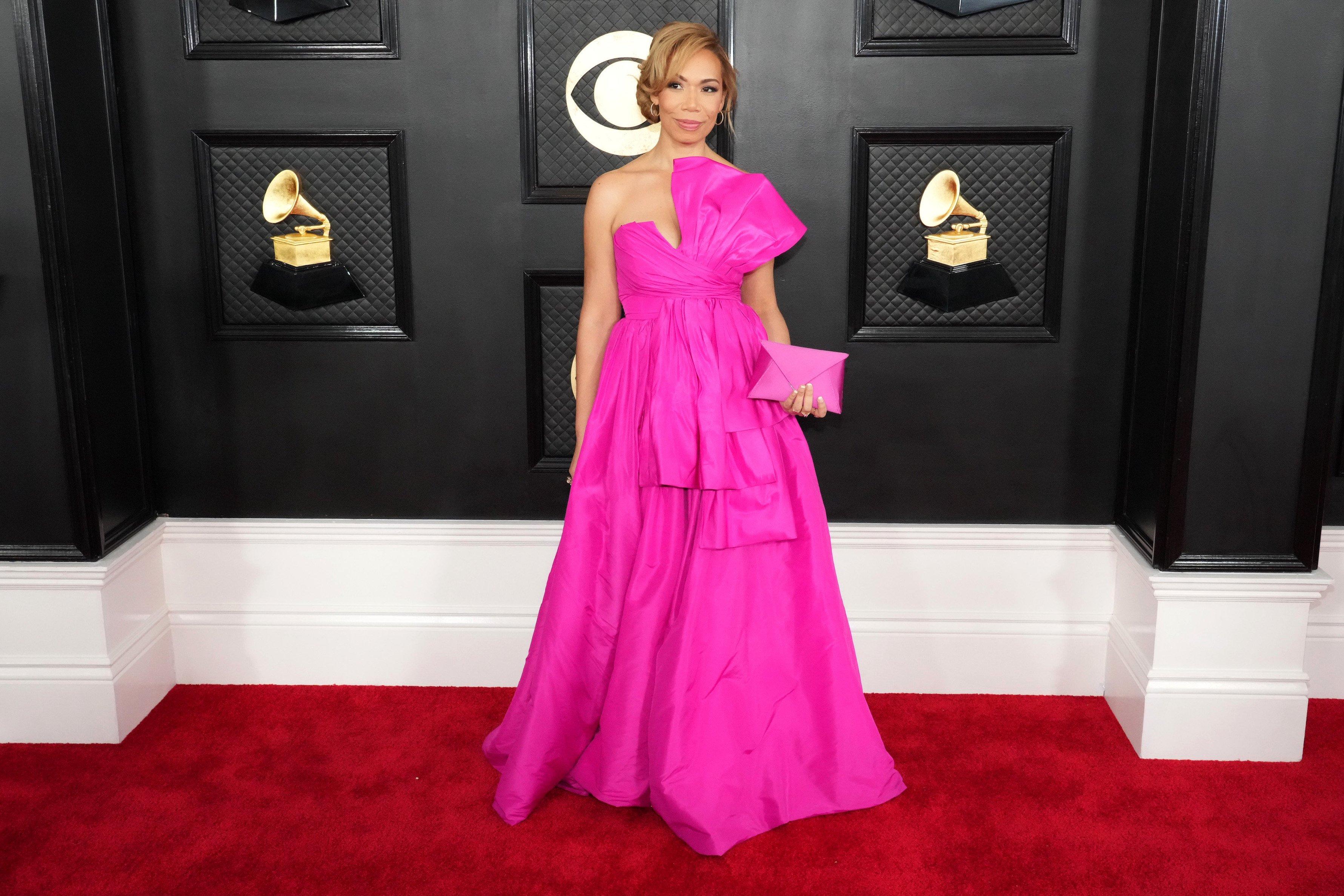
Photo: Jeff Kravitz/FilmMagic
video
Where Do You Keep Your GRAMMY?: Autumn Rowe Revisits Her Unexpected Album Of The Year Win With Jon Batiste
Acclaimed songwriter Autumn Rowe reveals the inspirational location where her Album Of The Year golden gramophone resides, and details the "really funny way" she first met Jon Batiste.
Ever since Autumn Rowe won a GRAMMY in 2022, it's been her biggest motivation. That's why the musical multi-hyphenate keeps the award nestled in her writing room — to keep her creative juices flowing.
"It reminds me that anything is possible," she says in the latest episode of Where Do You Keep Your GRAMMY?
Rowe won her first-ever career GRAMMY in 2022 with an Album Of The Year award for Jon Batiste's We Are. "It was very stressful," she recalls with a laugh.
"Right before they announced Album Of The Year, the pressure started getting to me," Rowe explains. "Album Of The Year is the biggest possible award you can win. So, I'm like, 'We didn't win any of these [categories], how are we going to win the biggest award?"
The win also taught her one unforgettable, valuable lesson: "We matter. The music matters. Everything matters. We just have to create it. If there isn't space for it, we have to make space for it. Don't wait for something to open."
Rowe says she grew up "super dirt poor" and never even had the opportunity to watch the awards ceremony on television. "To be a GRAMMY winner means it is possible for everyone," she declares.
Press play on the video above to learn more about the backstory of Autumn Rowe's Album Of The Year award, and remember to check back to GRAMMY.com for more new episodes of Where Do You Keep Your GRAMMY?
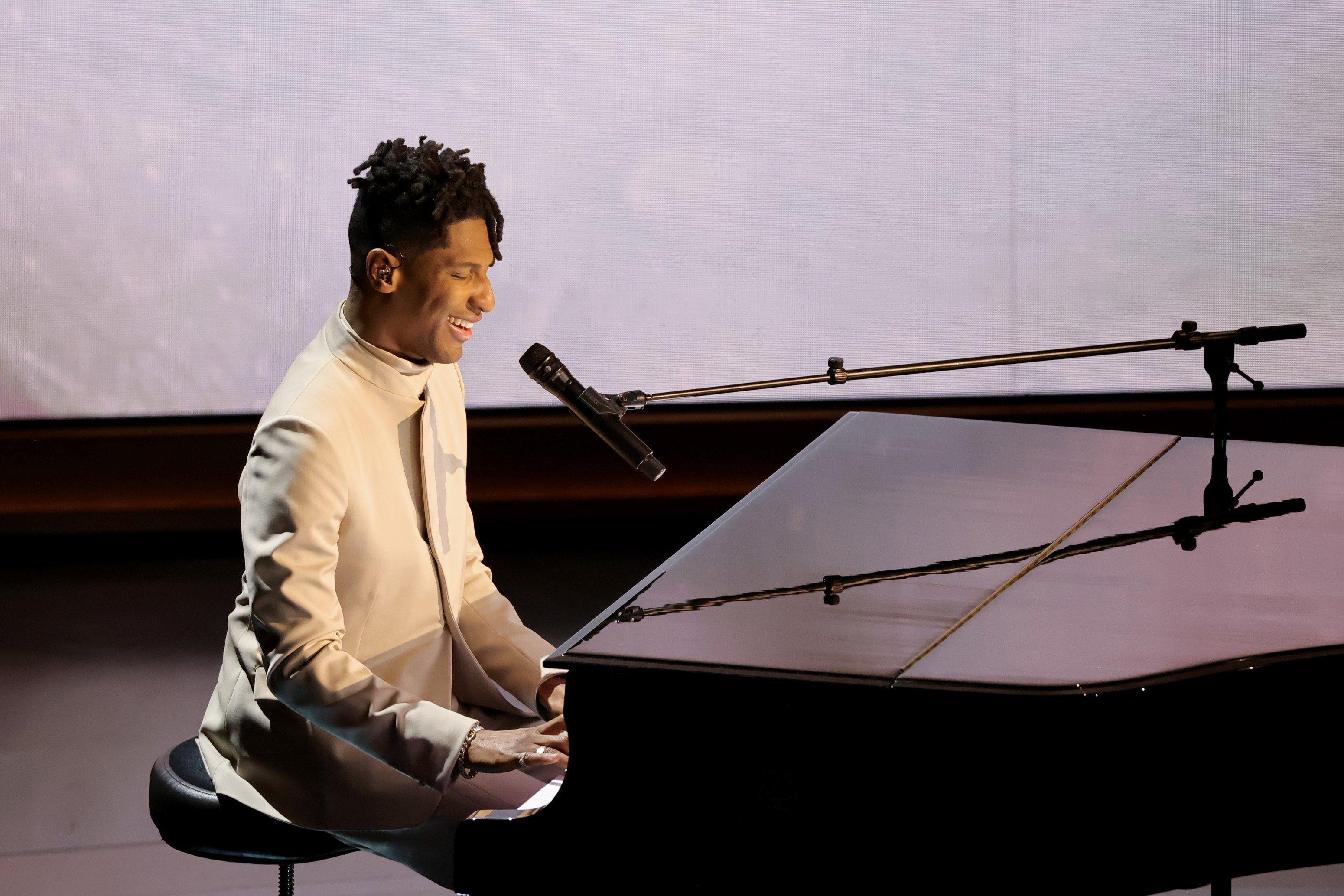
Photo: Kevin Winter/Getty Images
video
2024 Oscars: Watch Jon Batiste Perform A Poignant Rendition Of "It Never Went Away" From The Documentary Film 'American Symphony'
At the 2024 Academy Awards, five-time GRAMMY winner Jon Batiste performed a soul-nourishing version of "It Never Went Away" from ‘American Symphony,’ the acclaimed documentary film about his and wife Suleika Jaouad’s personal and creative lives.
At the 2024 Oscars on March 10, five-time GRAMMY winner and 20-time nominee Jon Batiste took the stage for a scintillating version of his co-write with Dan Wilson, "It Never Went Away."
For said performance, the multimedia phenom kept the proceedings spare and probing, letting his iridescent piano and singular pipes do the heavy lifting. Watch it above.
"It never went away/Every time I see your face," Batiste sang, in a commensurately understated, off-white stage outfit and backdrop. "The feeling's just the same/ It's never goin' away."
"It Never Went Away" was featured in the acclaimed 2023 documentary American Symphony, about his and his wife author Suleika Jaouad's personal and creative development — under the spectre of cancer and an impending debut at Carnegie Hall, of the symphony of the same name.
2024 Oscars: Watch Performances & Highlights
2024 Oscars: Watch Billie Eilish And FINNEAS Perform A Heartrending Version Of "What Was I Made For?" From The Motion Picture 'Barbie'
2024 Oscars: Watch Ryan Gosling And Mark Ronson Perform A Soaring, Hilarious Version Of "I'm Just Ken" From The Motion Picture 'Barbie'
2024 Oscars Red Carpet: Music Icons & Artists Shine Including Billie Eilish, Mark Ronson, Danielle Brooks & More
2024 Oscars: Billie Eilish and FINNEAS Win Best Original Song For "What Was I Made For?" From The Motion Picture 'Barbie'
2024 Oscars: Watch Becky G Perform "The Fire Inside" From The 2023 Comedy-Drama ‘Flamin’ Hot’
2024 Oscar Nominees Who Have Won A GRAMMY: Billie Eilish, Martin Scorsese & More
2024 Oscars: Watch Jon Batiste Perform A Poignant Rendition Of "It Never Went Away" From The Documentary Film 'American Symphony'
2024 Oscars: Ludwig Goransson's Masterful Composition for 'Oppenheimer' Wins Best Original Score
2024 Oscars: Watch Scott George and the Osage Singers Perform "Wahzhazhe (A Song For My People)" From 'Killers Of The Flower Moon'
'The Last Repair Shop' Filmmakers Share Behind-The-Scenes Stories About Oscar-Winning Documentary
How Afrobeats Star Bobi Wine Took On Uganda’s Dictatorship
"It was very complicated from a producing point of view to navigate the puzzle of Jon's insane life, and then trying to find our way into the hospital, and then back out again, and back in again," American Symphony director Matthew Heineman said last year at a live interview covered by GRAMMY.com.
In the same conversation Heineman aptly described the overall process as reflecting "the symphony of life that we witnessed over the past year."
Keep checking this space for more updates on the 2024 Oscars — including GRAMMY winners and nominees who are featured during the big night!
Inside American Symphony: 5 Revelations About The Jon Batiste Documentary
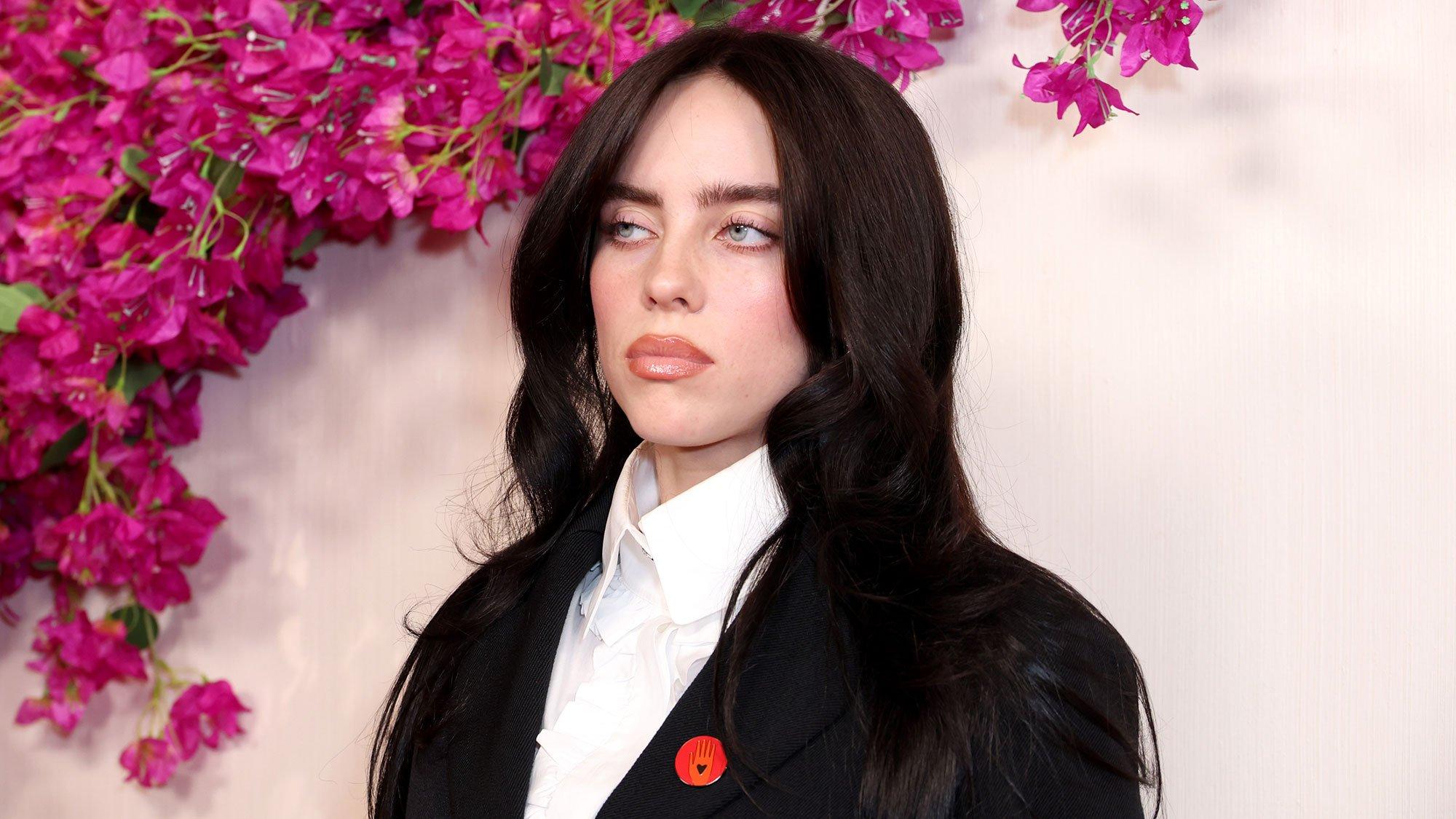
Photo: JC Olivera/Getty Images
news
2024 Oscars Red Carpet: Music Icons & Artists Shine Including Billie Eilish, Mark Ronson, Danielle Brooks & More
Visit the intersection of music and movies with a spotlight on the musical talents dazzling the red carpet at the Oscars. Billie Eilish, Danielle Brooks, and more show the creativity and style these multi-talented stars bring to Hollywood's biggest night.
Tonight, the red carpet becomes a runway that blends the art of fashion with the magic of cinema and sound.
The intersection of music and film has never been more luminous than at this year's Oscars, where numerous GRAMMY-winning artists including Billie Eilish, Jon Batiste, and Bradley Cooper are not just attending but are nominated for their contributions to the silver screen.
From enchanting melodies that tugged at our heartstrings to groundbreaking scores that redefined movie moments, these artists have already left an indelible mark on the music industry. Tonight, they grace the Oscars red carpet, showcasing not only their unparalleled talent but also their unique fashion sensibilities.
Take a closer look at these multifaceted talents and their journey from the GRAMMYs to the 2024 Oscars.
2024 Oscars: Watch Performances & Highlights
2024 Oscars: Watch Billie Eilish And FINNEAS Perform A Heartrending Version Of "What Was I Made For?" From The Motion Picture 'Barbie'
2024 Oscars: Watch Ryan Gosling And Mark Ronson Perform A Soaring, Hilarious Version Of "I'm Just Ken" From The Motion Picture 'Barbie'
2024 Oscars Red Carpet: Music Icons & Artists Shine Including Billie Eilish, Mark Ronson, Danielle Brooks & More
2024 Oscars: Billie Eilish and FINNEAS Win Best Original Song For "What Was I Made For?" From The Motion Picture 'Barbie'
2024 Oscars: Watch Becky G Perform "The Fire Inside" From The 2023 Comedy-Drama ‘Flamin’ Hot’
2024 Oscar Nominees Who Have Won A GRAMMY: Billie Eilish, Martin Scorsese & More
2024 Oscars: Watch Jon Batiste Perform A Poignant Rendition Of "It Never Went Away" From The Documentary Film 'American Symphony'
2024 Oscars: Ludwig Goransson's Masterful Composition for 'Oppenheimer' Wins Best Original Score
2024 Oscars: Watch Scott George and the Osage Singers Perform "Wahzhazhe (A Song For My People)" From 'Killers Of The Flower Moon'
'The Last Repair Shop' Filmmakers Share Behind-The-Scenes Stories About Oscar-Winning Documentary
How Afrobeats Star Bobi Wine Took On Uganda’s Dictatorship
Billie Eilish
Nominated for: Best Original Song, "What Was I Made For?" from Barbie
Billie Eilish, the alt-pop sensation with nine GRAMMY wins, brings her unique style to the Oscars wearing a tweed schoolgirl look from Chanel. At this year's Academy Awards, Eilish is nominated for the hauntingly beautiful "What Was I Made For?" [From The Motion Picture *Barbie*], the same track that won two GRAMMYs, for Song Of The Year and Best Song Written For Visual Media, at the 2024 GRAMMYs.
*Photo: JC Olivera/Getty Images*
Finneas O'Connell
Nominated for: Best Original Song, "What Was I Made For?" with Billie Eilish
Finneas O'Connell, the mind behind many of sister Billie Eilish’s hits and a 10-time GRAMMY winner in his own right, appears tonight in an ensemble that's as sleek as his production style. Nominated for the poignant "What Was I Made For?," he exudes confidence and creativity, showcasing the depth of his artistic vision.
*Photo: JC Olivera/Getty Images*
Jon Batiste
Nominated for: Best Original Song, "It Never Went Away" from American Symphony
Jon Batiste, a vision of grace on the red carpet in a monochromatic burgundy suit, brings the same passion to his music that won him five GRAMMYs and 19 nominations, including his Album Of The Year win for 2021's We Are.
Tonight, he's recognized for his soul-stirring "It Never Went Away", a testament to his versatility and depth as an artist. He won his first Oscar in 2021 for Best Original Score with Atticus Ross and Trent Reznor for their work together on Pixar's Soul.
*Photo:* Kevin Mazur/Getty Images
Mark Ronson
**Nominated for: Best Original Song, "I'm Just Ken" [From The Motion Picture Barbie]
Mark Ronson, the GRAMMY-winning producer known for hits like "Uptown Funk" and his work on Amy Winehouse's seminal Back to Black, brings well-suited sophistication to the red carpet. As an eight time GRAMMY winner, Ronson won his first Oscar award for Best Original Song in 2021 for "Shallow" for A Star is Born starring Lady Gaga and Bradley Cooper.
***Photo: Kevin Mazur/Getty Images***
Ludwig Göransson
Nominated for: Best Original Score, Oppenheimer
Ludwig Göransson, took home the Oscar for Best Original Score with a win for Oppenheimer. Known for his innovative soundscapes, Göransson's attire tonight — a satin-lapel tuxedo with wide pants and Cartier jewels — is a harmonious blend of classic and contemporary, much like his music.
*Photo: John Shearer/WireImage/Getty Images*
Bradley Cooper
Nominated for: Best Actor, Best Original Screenplay, Maestro
Bradley Cooper, presents a masterclass in red carpet fashion in a double-breasted tie-less tux with turquoise buttons and boot cut suit pants. A two-time GRAMMY winner for A Star Is Born in 2019, Cooper's transformation into Leonard Bernstein in Maestro is both a critical and stylistic triumph. Tonight, his attire is as meticulously curated as his performance, with a nod to the classical elegance befitting one of the most legendary conductors of all-time.
***Photo: Kevin Mazur/Getty Images***
Danielle Brooks
Nominated for: Best Supporting Actress, The Color Purple
Danielle Brooks dazzles in a black corseted gown with silver embellishments, a diamond necklace, and silver toned jewelry that speaks to her vibrant and powerful portrayal of Sofia in The Color Purple. A GRAMMY winner in 2017 for Best Musical Theater Album for her work in the Broadway revival, Brooks now shines on Oscars Sunday in an ensemble that is a tribute to Sofia's strength, resilience, and grace.
*Photo: Mike Coppola/Getty Images*
Diane Warren
Nominated for: Best Original Song, "The Fire Inside" from Flamin' Hot
Diane Warren, whose pen has graced many an iconic ballad, steps onto the red carpet in a "Flamin' Hot" look that echoes her lyrical genius. Nominated once again for her songwriting prowess, Warren's attire tonight is a nod to the fiery Becky G track she's nominated for tonight.
Warren has received 15 GRAMMY nominations through her career and a win for "Because You Loved Me" (Celine Dion, from Up, Close and Personal) which took home Best Song Written Specifically for a Motion Picture or for Television in 1997.
*Photo:* Rodin Eckenroth/Getty Images
Ariana Grande
Ariana Grande stepped onto the red carpet just days after the release of her album Eternal Sunshine in a custom Glinda-pink Giambattista Valli gown. Grande presented awards for Best Original Song and Best Original Score with Wicked co-star, Cynthia Erivo at the 2024 Oscars.
*Photo: Rodin Eckenroth/Getty Images*
Cynthia Erivo
Cynthia Erivo graced the red carpet in an emerald green Louis Vuitton look with voluminous leather ruffles. Erivo presented awards for Best Original Song and Best Original Score with Wicked co-star, Ariana Grande at the 2024 Oscars.
*Photo: Rodin Eckenroth/Getty Images*
Hailey Steinfeld
Nominated: Best Animated Feature, Spider-Man: Across the Spider-Verse
Hailey Steinfeld showed up to the 2024 Oscars ready to put on a show. The actress and singer wore a couture Elie Saab gown from the Spring/Summer 2024 collection in light blue with butterfly cape sleeves and a pleated skirt, accentuated by metallic appliqués adorning the bodice and wrists of the sleeves.
*Photo: Jeff Kravitz/FilmMagic/GettyImages *
Tia Carrere
Tia Carrere attends the 2024 Oscars red carpet. Carrere is a two-time GRAMMY winner for Best Hawaiian Music Album.
***Photo: Rodin Eckenroth/Getty Images***
Slash
Slash, the lead guitarist for Guns N' Roses assisted Ryan Gosling and Mark Ronson with a performance of 'I'm Just Ken' at the 2024 Oscars.
*Photo by Jeff Kravitz/FilmMagic*
2024 Oscar Nominees Who Have Won A GRAMMY: Billie Eilish, Martin Scorsese & More
